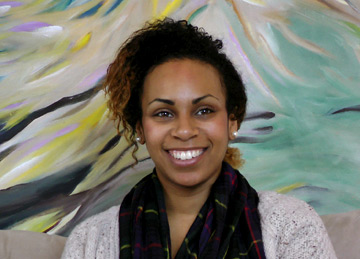Rachel

Cares for her mother
Age at interview: 27
Age at start of caregiving: 14
Rachel is a single 27-year-old woman who works full-time as a lawyer. She has cared for her mother (whom Rachel describes as a proud Caribbean woman) since she was a teenager, when her mother developed multiple sclerosis. Rachel became her caregiver when she was 14 years old. Her mother is now 61 and is semi-independent, living alone across the road from Rachel in an adapted apartment, where she receives daily support from Rachel and several paid caregivers.
Caring for her mother’s chronic illness has been an integral part of Rachel’s life since her early teens. It took some time before her mother was properly diagnosed – Rachel actually felt relieved to learn that it was multiple sclerosis and not Lou Gehrig’s Disease. Without her father around, Rachel soon became the primary caregiver, and continued until her mum started using a wheelchair and needed more help from other health and social service providers. Rachel loves her mum very much and they continue to have a very positive relationship, but Rachel feels that at 27 years old, she needs to start making different decisions to begin her own adult life. Rachel works long hours as a full-time lawyer, and has made many compromises and sacrifices around her own lifestyle, academic pursuits and life goals to be close to her mother. She dreams about moving east to be closer to friends. She believes that her mother is supportive of her plans to focus more on her own life at this point. Nevertheless, Rachel worries constantly when her mother is alone in her apartment. She calls her daily and visits as often as possible, but feels relieved to have more help for her mum’s care.
Rachel is frustrated by the lack of continuity in the care provided. Once there were about 30 different people attending to her mum in one week. Constant training is required for her mother’s ever-shifting care team. Overall, her interactions with the health and social care systems have not been satisfactory in terms of accessibility, responsiveness and empathy. She has found that the support she has received from friends, counsellors, members of her yoga class–and especially from MS support groups– has changed her life and provided essential coping skills. Many of the support group members have become close friends.
More content
- What is it like to be a caregiver? – RachelRealizing that it’s long-term is tough and sometimes Rachel wonders where the end is.
- Trying to find the right balance – Rachel (2)Rachel was always worried about her mother’s safety. Now, with more support in place, she thinks she could leave the city for the first time in her life.
- Trying to find the right balance – RachelCaring for someone can be beneficial if you allow it to be, says Rachel. Finding the balance is important.
- Support from family and friends – RachelWhen Rachel started opening up to friends, she found that many of them were also caring for their parents.
- Personal growth and transformation – RachelRachel has a close bond with her mother, and appreciates the time she has spent with her.
- Impact on health – RachelRachel thinks that all caregivers need to see a therapist whose moral compass is in-line with their own.
- Effects of care recipients’ behaviour – RachelRachel worries that her mother is no longer safe living by herself. Still, her mother wants nothing to do with assisted living.
- Challenging emotions and feelings – RachelRachel describes two incidents with her mother and how it made her fearful that something serious could happen when she wasn’t there.
- Becoming a caregiver -RachelRachel was a teenager when her mother was diagnosed with MS. She thinks she blocked a lot out, but remembers knowing she had to be there for her